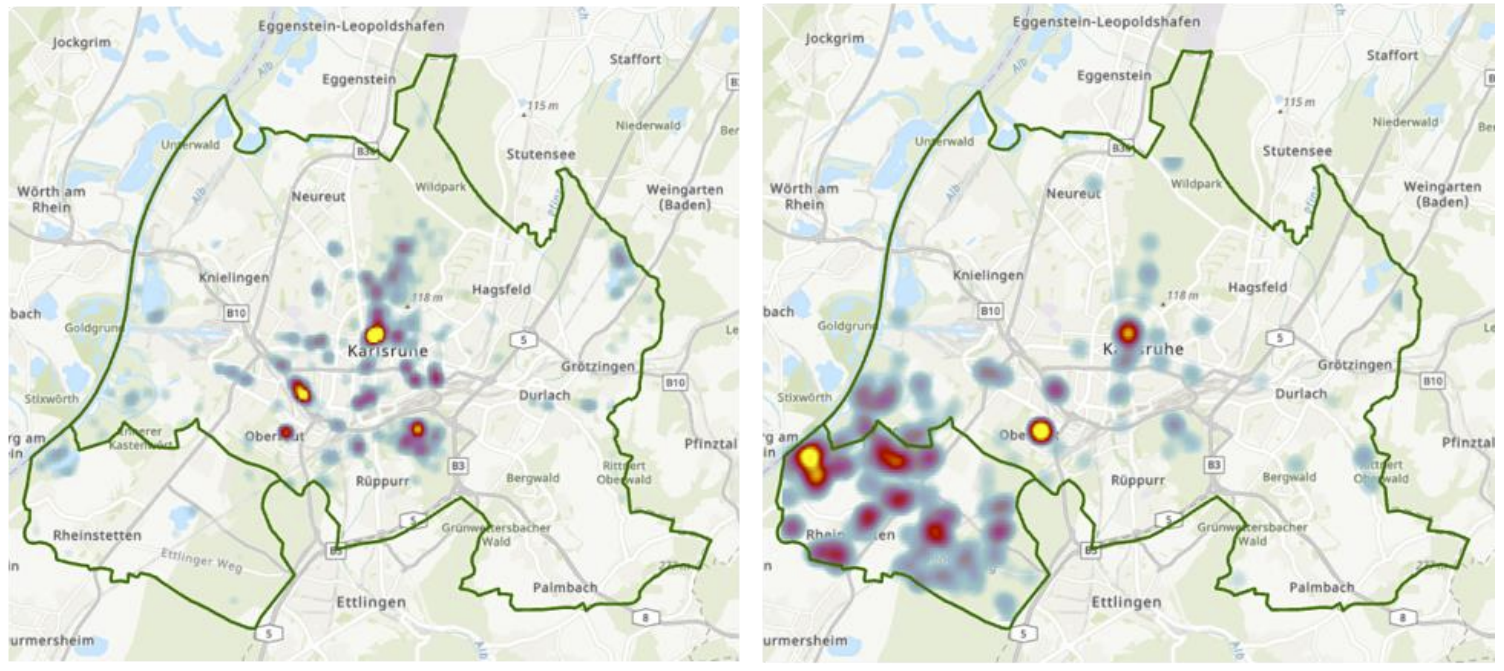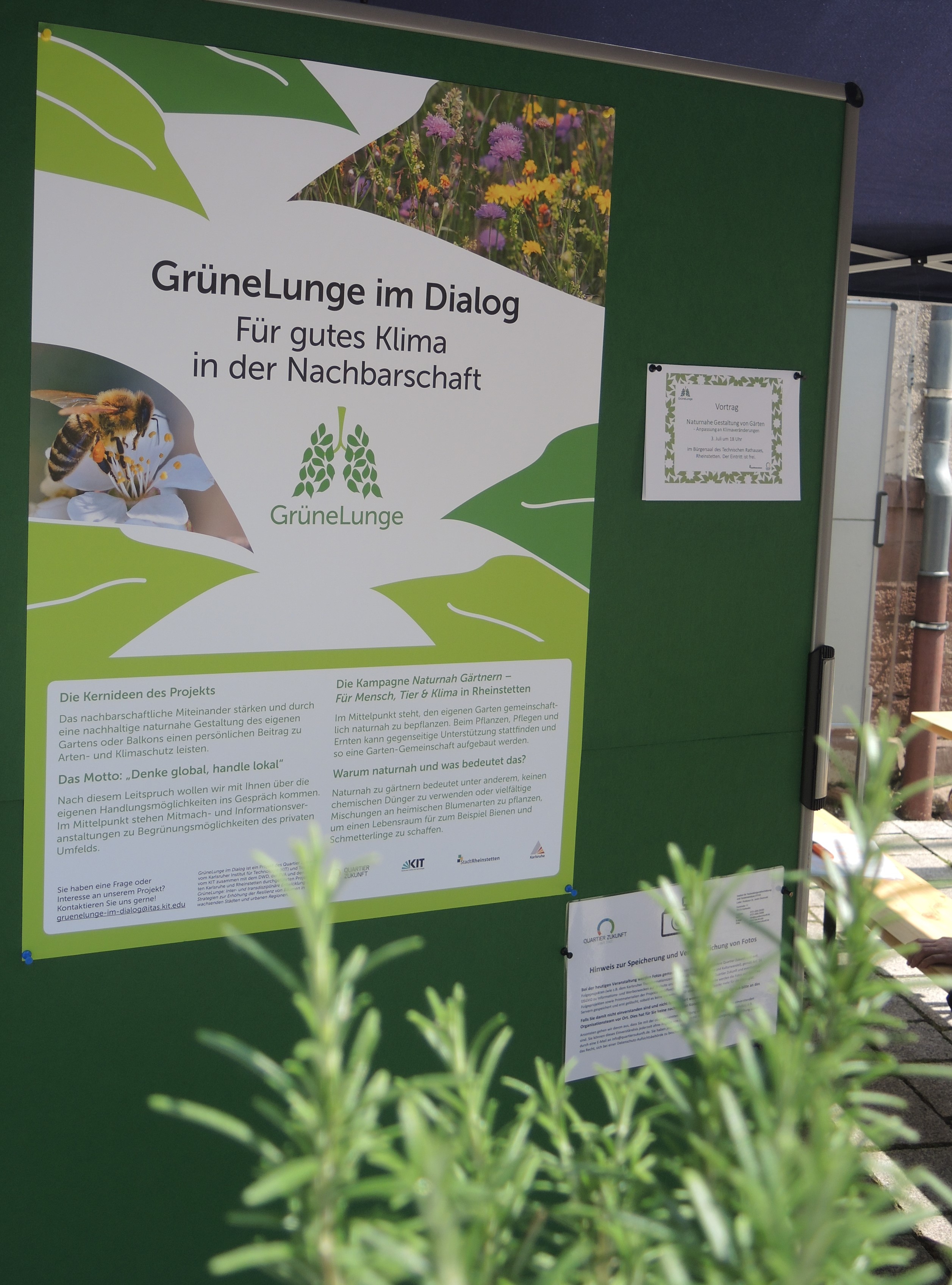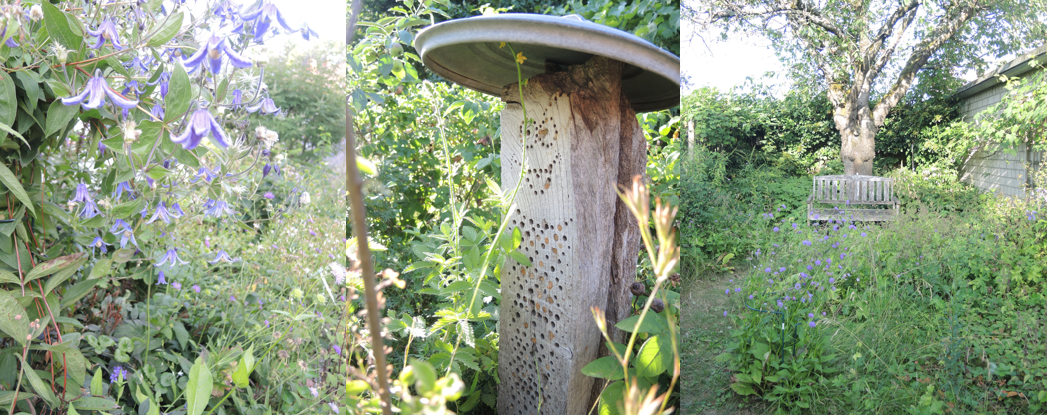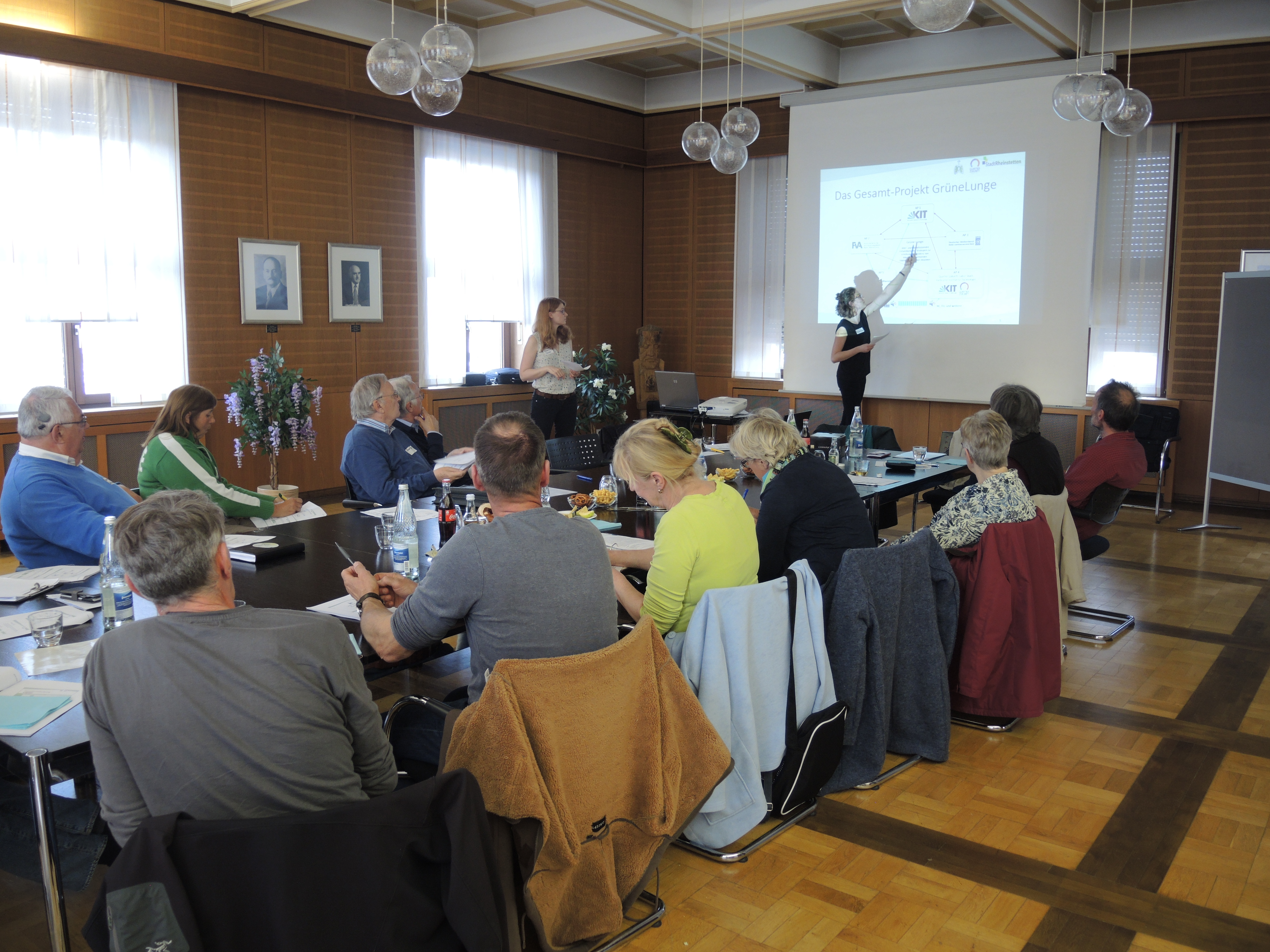As a sub-project of GrüneLunge 1.0, GrüneLunge in dialogue focused, as the name suggests, on dialogue. This exchange took place on two levels: a societal dialogue and a technical dialogue.
The societal dialogue was about actively involving citizens in the topic of urban green through a participatory approach, a public dialogue was created to raise awareness of the issue of resilience through greening. A focus was placed on the citizens' scope for action. The campaign Naturnah Gärtnern (Gardening Close to Nature) focused on how citizens can contribute to climate and species protection by designing their own gardens environment friendly. A participatory survey highlighted the non-material value of the urban forest for the population.
In various expert dialogues, the results of the GrüneLunge 1.0 project were discussed together with urban representatives and areas of action were jointly explored. The exchange with practitioners stays important and necessary in order to transfer the results of the project into long-term practice
Social Dialogue
The campaign “Naturnah Gärtnern” & presentations in Karlsruhe and Rheinstetten
The campaign in Rheinstetten
The campaign Naturnah Gärtnern - Für Mensch, Tier & Klima (Gardening Close to Nature - For People, Animals and the Climate) is based on the conviction that, in addition to the necessary political changes, everyone can make a contribution to climate and species protection - even in their own garden. Because private gardens in the city can be retreats for plants and animals and offer them habitats. There are 17 million private gardens in Germany alone. According to NABU, the combined area of all German gardens is roughly equivalent to the total area of nature reserves in Germany. With the campaign Naturnah Gärtnern, we wanted to motivate citizens in the city of Rheinstetten to design their own gardens eco-friendly. This means, for example, not using synthetic chemical fertilizers or planting diverse mixtures of mainly native flowers and berry bushes instead of rock gardens in order to create habitats for bees, butterflies and many other animals again and thus contribute to biodiversity. In addition, the idea of utilization was not neglected. Therefore, the cultivation of edible plants was promoted. A garden community was established, which offers supportin planting, caring and harvesting. Through this innovative format, the concept of nature-based gardening was introduced to a wider audience in the city. In addition, private households were motivated to set a good example in the neighborhood by (re)designing their own gardens in a nature-oriented way.
In GrüneLunge 1.0, a total of 16 participating households were supported and accompanied in redesigning their gardens. In March 2020, each household received technical advice from experts on how to develop their gardens. Together with the experts, orders were placed for native perennials and flower seeds, which were financed by the project. Participants received a "welcome package" that included an information brochure, a plaque for the garden gate, and a garden journal that was conceived and designed by us. Due to the contact restrictions of the COVID-19 pandemic, the 1st planning meeting was conducted online and an online forum was set up for sharing among participating households. In addition, due to the circumstances, other digital formats such as an email newsletter were introduced. The first planning and exchange meetings were also conducted virtually. Here, we suggested holding self-organized monthly garden meetings to promote exchange within the group. Due to contact restrictions, these garden meetings were held online by the group. At the 3rd planning meeting the need for a further garden inspection by experts was expressed, these were carried out in April 2021. In addition, another plant order was commissioned. Starting in the spring of 2021, digital garden meetings were held monthly, with physical garden meetings also held in early summer. A "hard core" of 5-7 people formed in the garden regulars' tables. They were instrumental in continuing the campaign in a self-organized manner even after its official conclusion.
Further events in Karlsruhe and Rheinstetten
In addition to the campaign, we organized numerous activities such as workshops and lecture evenings in Karlsruhe and Rheinstetten. This enabled us to highlight the consequences of climate change in cities, provide information about the importance of urban forest and green spaces and greening measures, and discuss them with citizens.
During a roundtable, for example, in April 2019 and a guided group discussion in July 2019, the attitudes, expectations and recommendations for action of local key persons were surveyed. The group of 10 to 15 key persons consisted of representatives of the city of Rheinstetten, BUND, Local Agenda 21, the local fruit and gardening association, the Karlsruhe District Office, gardening companies and otherwise active persons. The concept of close-to-nature gardening was welcomed, and at the same time reference was made to the town, which should "set a good example". Information sessions on nature-based gardening were held in July and October 2019, attended by approximately 35 to 50 people. The launch of the GrüneLunge 1.0 project was also publicly celebrated in October 2019 with various participatory activities.
Citizens survey: The non-material value of the urban forest
What is the significance of trees and forests in Karlsruhe and Rheinstetten for the citizens of the two communities? Where do they particularly value trees and forests in Karlsruhe and Rheinstetten? And which benefits of trees and forests are especially important to them and where?
Urban and near-urban trees and forests offer a variety of intangible benefits and values for the city population. These include, for example, a recreational value and aesthetic values; but also the opportunity to use urban green spaces with trees as meeting places with friends or family or as a source of inspiration, a special sense of home conveyed by trees and forests, and spiritual and religious values of trees and forests. In addition to the (climate) regulating services of urban trees and forests investigated in the GrüneLunge 1.0 project, these benefits, so-called cultural ecosystem services, which citizens in Karlsruhe and Rheinstetten derive from nature, will also be included in the analyses.
Within the framework of a citizen survey, the evaluation of immaterial benefits, i.e. cultural ecosystem services, was captured and spatially analyzed. In this way, differences in the use and appreciation of trees and forests in the city of Karlsruhe and Rheinstetten could also be identified. As a result of the survey, so-called HotSpot maps were produced, which show the spatial distribution of the particular appreciation of trees and forests in Karlsruhe and Rheinstetten and allow to analyze them (geo)statistically. Our results showed that respondents visited nearby urban forests and parks more frequently than those further away. At the same time, however, citizens attached a higher value to forests in the urban surroundings, regardless of the frequency of use. It also became clear that people without their own garden or balcony in particular rely on public green spaces. In addition, our research showed that forest visits increased significantly during the COVID-19 pandemic and that these visits contributed significantly to subjective well-being during a time of confinement and restriction. In particular, the results of the study will be integrated into the professional dialogue with the participating offices, institutions and professional representatives and thus contribute to the sustainable design and management of trees and forests in Karlsruhe and Rheinstetten in the future, adapted to the needs of the citizens.

In cooperation with our scientific colleagues and the cities of Rheinstetten and Karlsruhe, we developed a methodology for a compensation concept to assess the compensation of ecosystem services of trees and forests between the city of Karlsruhe and surrounding communities.
The expert dialogue combined our research results and those of our project partners. Here, together with the participating offices, institutions and expert representatives, we transferred the project results into the framework for action for climate adaptation measures, among other things with the aim of optimizing the existing tree management system. Based on the results of the citizens' survey on the intangible value of the urban forest, a so-called thought experiment was designed. The focus of the thought experiment was to discuss innovative measures to valorize the ecosystem services of trees and forests in Karlsruhe. Together with representatives of the city of Karlsruhe and experts, this concrete example was discussed during a transdisciplinary workshop in July 2021.
Within the framework of the expert dialogue, two meetings took place to discuss, , the requirements for street trees from practice and finally the results of the project GrüneLunge.
The prototype of a point system for ecosystem services (ES) was met with interest by the urban representatives and the experts present. From the feedback, it was concluded that there is a need for further elaboration of the point system and the compensation concept, which entails a reward for ecosystem services. Such a point system would advance the research of ES and would be a definite benefit for the urban administration.
.png)



